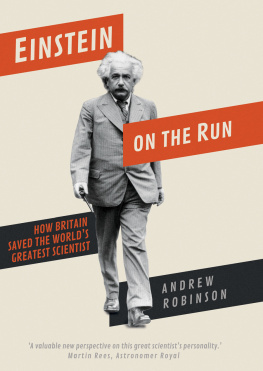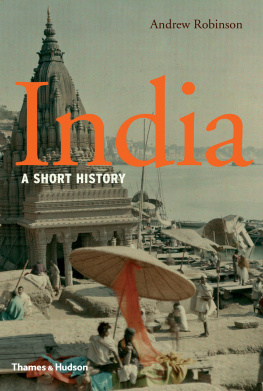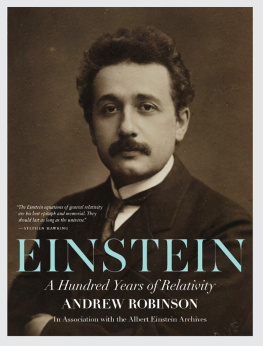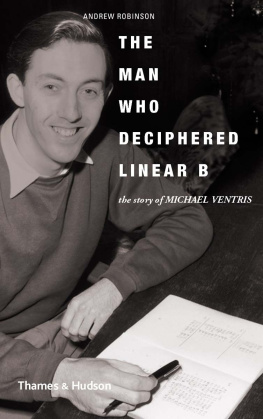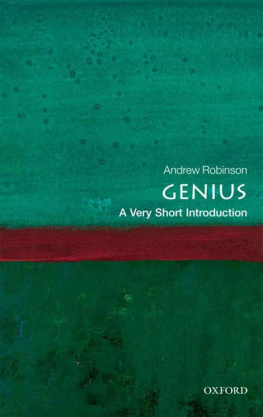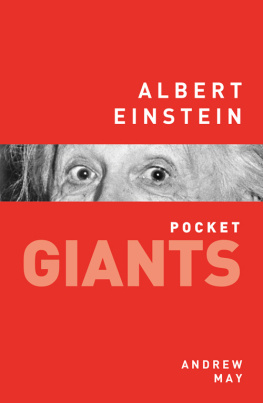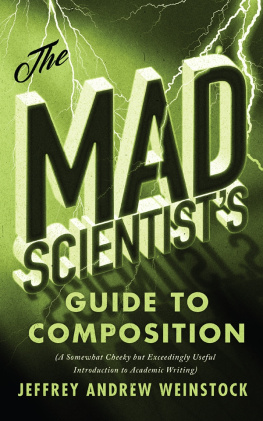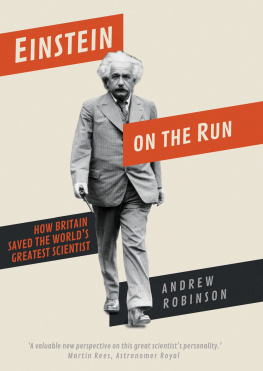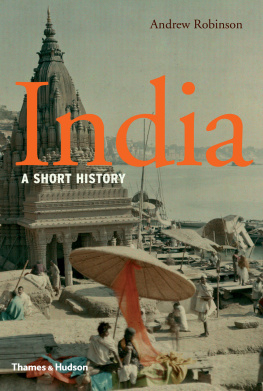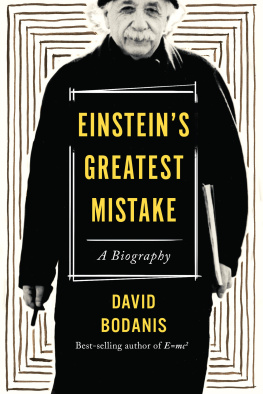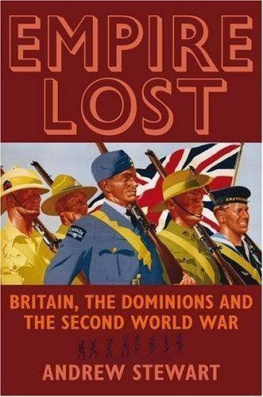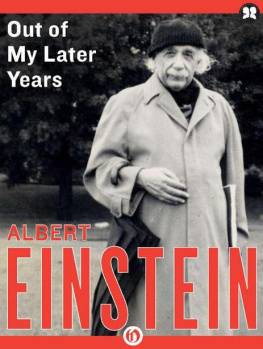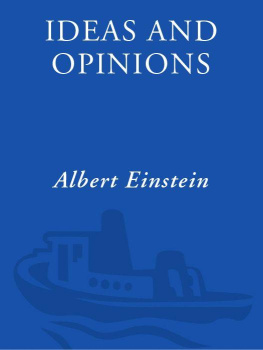Andrew Robinson - Einstein on the Run: How Britain Saved the World’s Greatest Scientist
Here you can read online Andrew Robinson - Einstein on the Run: How Britain Saved the World’s Greatest Scientist full text of the book (entire story) in english for free. Download pdf and epub, get meaning, cover and reviews about this ebook. year: 2019, publisher: Yale University Press, genre: Non-fiction. Description of the work, (preface) as well as reviews are available. Best literature library LitArk.com created for fans of good reading and offers a wide selection of genres:
Romance novel
Science fiction
Adventure
Detective
Science
History
Home and family
Prose
Art
Politics
Computer
Non-fiction
Religion
Business
Children
Humor
Choose a favorite category and find really read worthwhile books. Enjoy immersion in the world of imagination, feel the emotions of the characters or learn something new for yourself, make an fascinating discovery.
- Book:Einstein on the Run: How Britain Saved the World’s Greatest Scientist
- Author:
- Publisher:Yale University Press
- Genre:
- Year:2019
- Rating:4 / 5
- Favourites:Add to favourites
- Your mark:
- 80
- 1
- 2
- 3
- 4
- 5
Einstein on the Run: How Britain Saved the World’s Greatest Scientist: summary, description and annotation
We offer to read an annotation, description, summary or preface (depends on what the author of the book "Einstein on the Run: How Britain Saved the World’s Greatest Scientist" wrote himself). If you haven't found the necessary information about the book — write in the comments, we will try to find it.
Einstein on the Run: How Britain Saved the World’s Greatest Scientist — read online for free the complete book (whole text) full work
Below is the text of the book, divided by pages. System saving the place of the last page read, allows you to conveniently read the book "Einstein on the Run: How Britain Saved the World’s Greatest Scientist" online for free, without having to search again every time where you left off. Put a bookmark, and you can go to the page where you finished reading at any time.
Font size:
Interval:
Bookmark:
EINSTEIN ON THE RUN

Copyright 2019 Andrew Robinson
All rights reserved. This book may not be reproduced in whole or in part, in any form (beyond that copying permitted by Sections 107 and 108 of the U.S. Copyright Law and except by reviewers for the public press) without written permission from the publishers.
For information about this and other Yale University Press publications, please contact:
U.S. Office:
Europe Office:
Set in Fournier MT by IDSUK (DataConnection) Ltd
Printed in Great Britain by Gomer Press Ltd, Llandysul, Ceredigion, Wales
Library of Congress Control Number: 2019932771
ISBN 978-0-300-23476-3
A catalogue record for this book is available from the British Library.
10 9 8 7 6 5 4 3 2 1
For my wife, Dipli,
moromere, as ever
Contents
Illustrations
Preface
W henever we think of the worlds best-known scientist, we generally picture him in relation to Germany, where Albert Einstein was born, or Switzerland, where he first became a physicist, or the United States, where he settled during his last two decades, or Israel, to which he willed his massive archives because of his Jewish sympathies.
Less often considered is Britain. Yet, it would be no exaggeration to say that Britain is the country that made Einstein into the worldwide phenomenon he is today. Profound and creative, Einsteins entanglement with Britain was both intellectual and emotional. In 1927, while he was living in Germany, he wrote to a British physicist in Oxford: in England ... my work has received greater recognition than anywhere else in the world. In 1933, while revisiting Britain, he remarked with uncharacteristic fervour to a London journalist: I love this country. In 1937, having relocated from Europe to the United States, he told a refugee German physicist in Edinburgh that Britain was the most civilised country of the day.
Einsteins relationship with Britain flourished for over half a century. In the 1890s, British theoretical and experimental physics, as epitomised by Isaac Newton, sparked his scientific development during his school and college education in Switzerland. In 1919, British astronomers confirmed his general theory of relativity, which made Einstein internationally famous. In 1933, Britain saved him from likely assassination by Nazi extremists by offering him refuge. And in 1955, Britain gave rise to his most enduring political statement: the RussellEinstein Manifesto against the spread of nuclear weapons during the Cold War, initiated by the philosopher, mathematician and political activist Bertrand Russell the last document signed by Einstein before his death.
All this was despite Einsteins never fluent, indeed at times comical, grasp of English, which he had not formally learned. It just wont stick to my ancient skull, he confessed to his diary in 1931 (of course in German), after trying to study English on a long ocean voyage while going to lecture in the United States. Einsteins English was very simple, containing about 300 words pronounced in a very peculiar way, noted his English-speaking physicist friend Leopold Infeld, a Polish refugee from Nazism who collaborated closely with Einstein at Princeton in the 1930s in the writing of their joint popular success, The Evolution of Physics. I cannot write in English, because of the treacherous spelling, Einstein confessed in 1944 to another physicist, Max Born, an old friend from Germany who had studied in Cambridge as a young man and was comfortable with speaking and writing the language. When I am reading it, I only hear it and am unable to remember what the written word looks like.
Even so, Einstein was an Anglophile, declared three American scholars of Einstein Alice Calaprice, Daniel Kennefick and Robert Schulmann without hesitation or qualification in their study, An Einstein Encyclopedia, published by Princeton University Press in 2015. Nonetheless, Einstein specialists, including his many biographers, have tended to downplay his relationship with Britain because of its diversity and subtlety. I myself underrated it in my book, Einstein: A Hundred Years of Relativity as did the books nine expert contributors.
This book, Einstein on the Run, is the first to focus on Einstein and Britain. It brings together material that is both familiar and unfamiliar some of it hitherto unpublished from disparate parts of the Einstein archives. These archives at the Hebrew University in Jerusalem contain a total of around 30,000 documents, making them similar in size to the archives of Napoleon Bonaparte and several times the size of those of Newton and Galileo, according to the unique Einstein Papers Project at the California Institute of Technology. Since the 1980s, the project has overseen the publication of fifteen large volumes of The Collected Papers of Albert Einstein (CPAE), the latest of which concludes in 1927 leaving nearly three decades of his life still to be published. No wonder that Einstein still has the power to surprise and fascinate the world. As George Bernard Shaw said of him in a speech in London in 1930, at a dinner to honour Einstein: I rejoice at the new universe to which he has introduced us. I rejoice in the fact that he has destroyed all the old sermons, all the old absolutes, all the old cut and dried conceptions, even of time and space, which were so discouraging....
Acknowledgements
T his book would not have been possible without the cooperation of the Albert Einstein Archives in Jerusalem, which made available to me Einsteins articles, lectures and letters, some of which are unpublished, plus related material and letters to Einstein. Its archivists, Barbara Wolff and Chaya Becker, were consistently helpful while I was researching both this book and Einstein: A Hundred Years of Relativity. My deepest gratitude goes to their colleague Or Orith Burla, who not only retrieved much archival material at my request but also suggested material I was not aware of and on occasion helped me to translate it from German into English. Her assistance with my research was generous, invaluable and particularly welcome to a freelance author.
I am also grateful to the fellows of Christ Church, Lady Margaret Hall and Nuffield College in Oxford, to the Rhodes House Trustees and to the English-Speaking Union, for permission to quote correspondence relating to Einsteins visits to Oxford, notably the Oxford diary of Margaret Deneke and the letters of Frederick Lindemann (Lord Cherwell).
Sebastian Born, on behalf of the Born family, generously granted permission to quote passages from the letters written by his grandfather Max Born to Einstein, originally published in English translation as The BornEinstein Letters. Im sure he would have been, and we are, happy that your work continues to reveal his thought and insight in these conversations with his great friend Einstein.
Many archivists, based mainly in Britain, have been unusually helpful with my research. It is a pleasure to thank: Nicolas Bell (Trinity College, Cambridge), Judith Curthoys (Christ Church, Oxford), Gavin Fuller (Telegraph Media Group, London), Emma Huber (Taylor Institution Library, Oxford), Michael Hughes (Bodleian Library, Oxford), Clare Kavanagh (Nuffield College, Oxford), Suzanne Keyte (Royal Albert Hall, London), Oliver Mahony (Lady Margaret Hall, Oxford), Charlotte Oxendale (Rhodes House, Oxford), Niels Sampath (Oxford Union Library), Michael Simonson (Leo Baeck Institute, New York) and Anna Towlson (London School of Economics). Others include: Frank Baker (John Rylands Library, Manchester), Jessica Borge (Kings College, London), Rosemary Dixon (Archant Library, Norwich), Melissa Downing (Rhodes House, Oxford), Heidi Egginton (Churchill Archives, Cambridge), Robyn Haggard (Museum of the History of Science, Oxford), Stephen Hebron (Bodleian Library, Oxford), Laura Hilton-Smith (Leeds University Library), Loma Karklins (Caltech Archives, Pasadena), Lee Macdonald (Museum of the History of Science, Oxford), Wilma Minty (Bodleian Library, Oxford), Alistair Murphy (Cromer Museum), Laura Outterside (Royal Society, London), Emma Quinlan (Nuffield College, Oxford), Ed Smithson (Nuffield College, Oxford), Jean-Michel de Tarragon (cole Biblique, Jerusalem), Bridget Whittle (McMaster University, Hamilton) and Harry Wright (Friends House, London).
Next pageFont size:
Interval:
Bookmark:
Similar books «Einstein on the Run: How Britain Saved the World’s Greatest Scientist»
Look at similar books to Einstein on the Run: How Britain Saved the World’s Greatest Scientist. We have selected literature similar in name and meaning in the hope of providing readers with more options to find new, interesting, not yet read works.
Discussion, reviews of the book Einstein on the Run: How Britain Saved the World’s Greatest Scientist and just readers' own opinions. Leave your comments, write what you think about the work, its meaning or the main characters. Specify what exactly you liked and what you didn't like, and why you think so.

